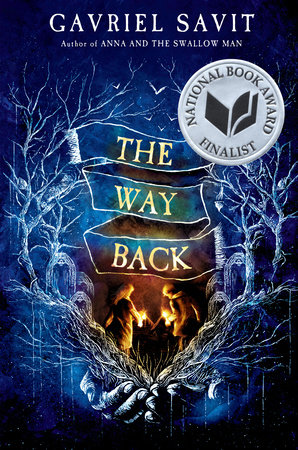Gavriel Savit Author Essay

The Power of Storytelling
I’m ashamed to say that in my early adulthood, I sort of forgot how to read. Not literally, of course— I am, after all, a writer. I’m usually drowning in research and nonfiction. What I mean is that I forgot how to read like a kid— how to get lost in a tale.
I can cite any number of excuses, and most of them are true: it’s hard to concentrate on your own nascent story when you’re swimming in one that’s already finished; there’s always more work to be done; smartphones are dark sorcery that feast on your time and attention.
But there’s always a valid reason not to. The trick is in finding the reason to do it anyway.
And— fortunately or unfortunately— I’m finding plenty of reasons here in October 2020. When I’m not working or looking after my kids, I tend to default to the newsfeed. Whatever your perspective on the world, I think we can all agree that things aren’t looking their best: rising case counts, skyrocketing unemployment, election anxiety. My back starts to spasm, my shoulders ratchet up toward my ears. My mind rolls along faster and faster, matching the speed of my doomscrolling. It just makes things worse, and I keep going and going.
The only reliable remedy I’ve found for this is fiction, and scientific research seems to back me up: studies have shown that reading novels increases brain function and relieves anxiety.
This has certainly been my experience. It’s almost meditative: you relax your body, slow the pace of your racing mind to match the lollop of a long sentence. You seem to move away from your own body, and when the process is well underway, you slip into a kind of double consciousness: you may hear the music on the radio, smell the cooking in the kitchen, but you’re just as much walking the halls of the Pentagon, or Pemberley, or Cair Paravel.
The first book I returned to when I determined to recover my childlike reading practice was Peter S. Beagle’s The Last Unicorn, and it worked perfectly. It’s slim and enchanting, a quick and inviting read peppered with impossible metaphors like “her voice left a flavor of honey and gunpowder on the air” that leave just enough of a bump in the road of double consciousness to make you aware of what’s going on.
Quickly, I moved on to a long ambition of mine: Patrick O’Brian’s Aubrey-Maturin series, 20 impeccably written and scrupulously researched novels of seafaring and derring-do in the 19th century Royal Navy. Over the course of this monotonous pandemic, I have ridden these books through blistering calms and frigid antarctic, ice-studded seas. They’ve carried me through the prisons of Paris, the streets of Bombay, and even a shipwreck on the shores of Desolation Island.
I cannot say how good this has been for me. Books have kept me in sanity and good spirits for months now in what— dear God, I hope— may prove to be one of the more challenging periods in our history.
In his fantastic book On Writing, Stephen King describes this bizarre transportive, transformative process— reading, writing, storytelling— as telepathy. He gives a vivid description of a white rabbit in a cage and, of course, we see it in our minds. Neil Gaiman’s phrase for this phenomenon is more poetic, and perhaps nearer the mark: he calls a book “a dream that you hold in your hands.”
I’ll go one further: I’ll say that the act of writing— and crucially, reading— is nothing less than full-on, literal magic.
This may seem a bit ridiculous, but let me explain:
Every morning, I wake up early, often while its still dark. I brew myself a bitter black potion, and as I begin to sip at it, my mind kicks into overdrive. I shrug into a warm, ashy black garment of alpaca wool and enter my sanctum. Here, I play curated music to move the cultivated hallucinations in my mind, and carefully, using very specific words in a very specific order, I proceed to alter your individual consciousness, often hundreds of miles away, often years and years in the future.
What on earth is this if not a ritual of magic?
What on earth am I doing if not casting a spell?
For the last couple of years, my rituals have been devoted to conjuring a new vision. The Way Back is a book that follows the spooky adventures of two 19th century Jewish kids— Bluma and Yehuda Leib— as they make their way from their little shtetl of Tupik into the land of demons and Death. Much happens along the way— there are laughs and losses, encounters with the sacred and the sinister. But my ritual is incomplete without your participation. Reading, as I’ve recently rediscovered, is at least half of the magic.
So join me, won’t you? Find a cup of your favorite potion and a warm magic garment. Settle into your sanctum— couch, or bed, or armchair— and let’s begin.
Let’s make some magic.
Praise for THE WAY BACK
A 2020 National Book Award Finalist
“Lyrical and fantastic…. Steeped in the rich traditions of ghost stories and Jewish folklore, this remarkable feat of storytelling is sure to delight.” —Kirkus Reviews, starred review
“A bewitching allegorical adventure comprised of small, beautifully composed moments.” —Publishers Weekly, starred review
“Savit builds the action with a storyteller’s assured cadences, creating a story rich in elements of Jewish folk tradition and flashes of both humor and the grotesque.” —The Bulletin, starred review
“This work of prodigious imagination is especially notable in its author’s uncanny ability to create a visceral suspense that captures readers’ attention and won’t let go as the pages fly by.”—Booklist, starred review
“Savit crafts an absorbing fantasy and gives teens plenty to contemplate about life, love, storytelling, and family.” —The Horn Book




